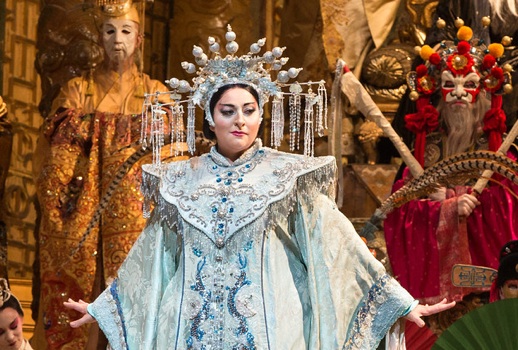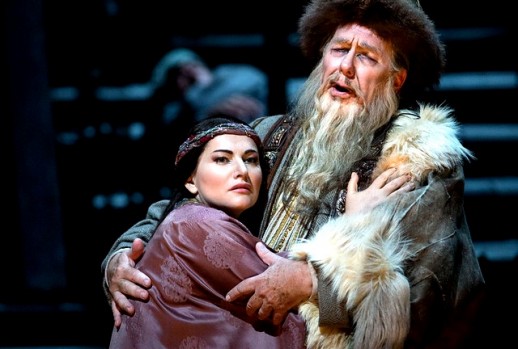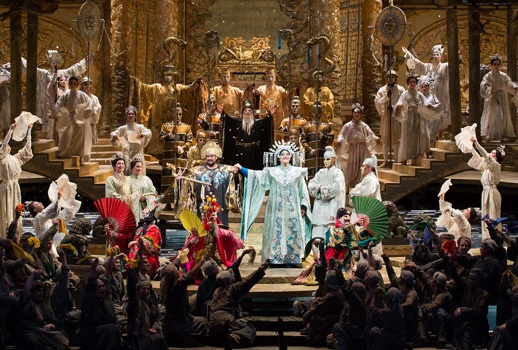
Maybe not.
In her first stab since 2008 at the mercilessly demanding title role, Goerke made a frustratingly equivocal impression. The warm, enveloping middle range of her formidable soprano immediately arrested one’s attention as she launched into the chilling narrative of Turandot’s traumatized ancestor Luo-Ling. However, as the vocal line rose, the voice became tighter and brighter, the climaxes harsh and edgy. The soaring security on top that one craves was missing. While eminently audible, she lacked the expected dominating power to soar over the large Met chorus except when she moved closer to the edge of the stage.
Although she was commandingly frosty in the stand-and-deliver staging of “In questa reggia” and the riddle scene, Goerke melted touchingly in her unnerved response to Calaf’s correct answers. Other sopranos have been fiercer in their brutal questioning of Liù suggesting that this princess’s transformation had already begun. Although she found the final act’s somewhat kinder tessitura more congenial, she failed to imbue her soprano with the sympathetic warmth that can make the shockingly abrupt love final duet more palatable.
Although I love much of the opera, the startlingly abrupt ending of Turandot continues to disturb me. One loses what little sympathy one has for the opaque Calaf as he relentlessly pursues his princess while the wrenching sadness of Liù’s sacrifice still hangs in the air. Had Puccini lived he likely would have made the seduction of Turandot more dramatically convincing, but the continued use at the Met of the much-abbreviated Alfano version of the final scene makes for an unsatisfying denouement.
That problematic “happy” ending also brings out in full force all the kitschiest elements of the enormous Met Zeffirelli-ganza: the hyper-active dancing girls go into over-drive while glittering golden “snow” showers down on the smiling couple as Turandot grabs a handy crown and scepter to dub Calaf her consort. The extravagant busy-ness of the production can be wearying, but it’s futile to resist being bowled over by the glittering opulence of the sets and costumes.

Both times I was in Family Circle standing room where teeming Peking can appear a bit remote. It was an unexpected revelation then to see it all again after so long from a seat in the orchestra. I wondered if the production has recently been refurbished as it looked in fine fettle after nearly 29 years of use. Although applauding the scenery is one of opera-goers’ worst sins, it was tempting to join in Wednesday as many in the audience gasped and clapped wildly as the lights went up on the second act’s dazzling white and gold throne room.
The splendor of that scene was mirrored in the grandly expansive conducting of Paolo Carignani who elicited boldly colorful playing from the orchestra while the chorus sounded as thrillingly vibrant as it had in Otello two nights earlier. The extended scene for Ping, Pang and Pong can often be a bore, but the lively, mellifluous singing of Dwayne Croft, Tony Stevenson and Eduardo Valdes made it a real highlight. These days James Morris’s bass-baritone can sound pretty gritty and toneless, but his modest Timur touchingly mourned his companion’s shocking suicide.
Georgian soprano Hibla Gerzmava surprised as an unconventional Liù—her big cool voice lacked the expected Italianate warmth and modesty. She sang with fervor and nuance but not every piano and pianissimo floated in quite the way she intended. Her Antonia in Les Contes d’Hoffmann during her debut season at the Met five years was impressive, but one wonders if she’s still trying to figure out where she’s going as her biography lists her roles this season as including, besides her first-ever Desdemona at the Met, Donna Anna and Lucia and Cherubini’s Médée!

There’s something almost endearingly “retro” about his self-absorbed stage persona: he never seems too concerned with interacting with his colleagues or even remembering to act at all. He’s all about punching out the next big high notes which remain in pretty good estate although they might lack the squillo so many covet in this repertoire.
What one misses most in Álvarez’s singing is legato—getting the notes out in the biggest way possible is the only goal. Happily the voice still retains much of its beauty so his Calaf, despite its inelegance, proved more pleasing than those of a number of tenors I have heard assay the role on recordings or broadcasts over the past decade.
The remaining fifteen performances of Turandot will provide fascinating opportunities to compare the four sopranos tackling the daunting title role: Goerke sings just three more performances and I would be surprised if she kept the role in her repertoire. Her upcoming performances of Strauss’s Elektra in Boston and New York will doubtless allow her to display her gifts in more congenial music.
Lise Lindstrom who has sung Turandot to wild acclaim over the past few years arrives next month; then the much-discussed American Jennifer Wilson who stars in the opera’s most recent recording makes a long-anticipated house debut on November 12 opposite tenor Yusif Eyvazov who will have made his own Met debut at the previous performance. For the final six shows in January star Wagnerian Nina Stemme returns to the Met after a six-year absence to tackle a role that earned her mixed reviews earlier this year at La Scala.
Photos by Marty Sohl/Metropolitan Opera



